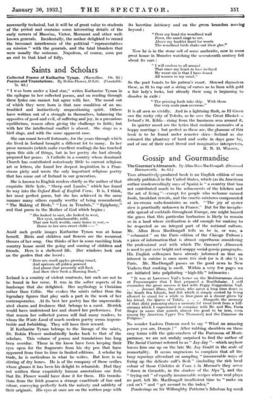Saints and Scholars
" I WAS born under a kind star," writes Katharine Tynan in the epilogue to her collected poems, and on reading through these lyrics one cannot but agree with her. The mood out of which they were born is that rare condition of an un- troubled and instinctively unquestioning spirit. Others have written out of a struggle in themselves, balancing the opposites of good and evil, of suffering and joy, in a precarious equilibrium, reason often giving the challenge to faith; but with her the intellectual conflict is absent. She sings as a bird sings, and with the same apparent ease.
She can count herself fortunate, for the years through which she lived in Ireland brought a different lot to many. In her prose memoirs (which make excellent reading) she has touched upon this side of things, but in her poetry she had already prepared her peace. A Catholic in a country whose dominant Church has contributed notoriously little to current religious art or letters, she found her deepest inspiration in a Fran- ciscan piety and wrote the only important religious poetry that has come out of Ireland in our generation.
She is known to English readers chiefly as the author of that exquisite little lyric, Sheep and Lambs," which has found its way into the Oaford Book of English Verse. It is, I think, her most perfect poem, but she has achieved in the same manner many others equally worthy of being remembered. " The Making of Birds," " Lux in Tenebris," " Epiphany," and that poem to the Mother of God which begins :
" She looked to east, she looked to west, Her eyes, unfathomable, mild, That saw both worlds, came home to rest,— Home to her own sweet child— "
Amid such gentle images Katharine Tynan was at home herself. Birds and children and flowers are the recurrent themes of her song. One thinks of her in some rambling Irish country house amid the going and coining of children and friends. Hers is a sheltered life. Her -windows look out on the garden that she loved :
" Here arc small apples growing round, And apricots all golden gowned And plums that presently will flush And show their bush a Burning Bush."
Ireland is a country of violent contrasts, but such are not to be found in her verse. It was in the softer aspects of its landscape that she delighted. Her mythology is Christian rather than Celtic. She evokes the saints rather than the legendary figures that play such a part in the work of her contemporaries: At its best her poetry has the unpremedit- ated charm and freshness that belongs to a carol. Herrick would have understood her and shared her preferences. For that reason her collected poems will find many readers, to whom the Waste Land of much modern poetry seems impene- trable and forbidding. They will have their reward.
If Katharine Tynan belongs to the lineage of the saints, Dr. Robin Flower undoubtedly harks back to that of the scholars. This volume of poems and translations has long been overdue. Those in the know have been keeping their eyes open for the fragments from his shy pen that have appeared from time to time in limited editions. A scholar by trade, he is meticulous in what he writes. But here is no stirring of dry bones. He is of the company of those scribes whose glosses it has been his delight to reburnish. Ilad they not written these exquisitely human annotations one feels that Dr. Flower would have done it for them. His transla- tions from the Irish possess a strange exactitude of line and colour; conveying perfectly both the naivety and subtlety of their originals. His eyes at once are on the written page with -its lacertine intricacy and on the green branches moving
beyond :
" Over my head the woodland wall
Rises, the ouzel sings to me, Above my booklet lined for words
The woodland birds shake out their glee."
Now he is in the stone cell of sonic anchorite, now in some great house in Minister watching the seventeenth century fall about its ears :
" I will confess to all around That since my. heart to love inclined My worst sin is that I have found 411 women to my mind."
So the poet boasts to his patron's court. Shrewd rhymsters these, as fit to rap out a string of curses as to limn with gold a fair lady's locks, but already their song is beginning to dissolve in exile : " The grieving lords take ship. With these Our very souls pass overseas."
It is all seen so vividly. And in a lightning flash, as Ill Greco saw the rocky city of Toledo, so he sees the Great Blasket- Ireland's St. Kilda—rising' from the luminous seas around it.
In quieter mood are the lyrics that enshrine memories of a happy marriage ; but perfect as these are, the glamour of this book is to be found under remoter skies—Ireland as she coloured the phantasy of bard and scribe in days gone by, and of one of their most literal and imaginative interpreters.
R. N. 11. WILSON.




































 Previous page
Previous page